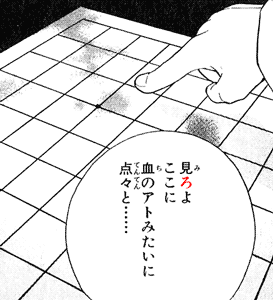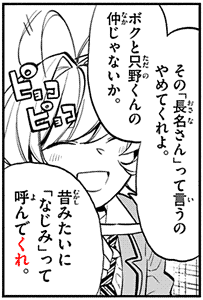For example, shine! 死ね!, "die!" is the meireikei of shinu 死ぬ, "to die."
Conjugation
For reference, how to conjugate the meireikei.| ~! | ||
| Irregular Verbs | ||
| kuru くる | koi こい | |
| suru する | shiro しろ | seyo せよ |
| Godan Verbs | ||
| kau 買う | kae 買え | |
| kaku 書く | kake 書け | |
| oyogu 泳ぐ | oyoge 泳げ | |
| korosu 殺す | korose 殺せ | |
| katsu 勝つ | kate 勝て | |
| shinu 死ぬ | shine 死ね | |
| asobu 遊ぶ | asobe 遊べ | |
| yomu 読む | yome 読め | |
| kiru 切る | kire 切れ | |
| Ichidan Verbs | ||
| kiru 着る | kiro 着ろ | kiyo 着よ |
| taberu 食べる | tabero 食べろ | tabeyo 食べよ |
| i-Adjectives | ||
| kawaii 可愛い | ||
| na-Adjectives | ||
| kirei na 綺麗な | ||
| Jodoushi 助動詞 | ||
| masu ます | mase ませ | |
| desu です | ||
For godan verbs, the meireikei ends in the ~e vowel, similar to the kateikei 仮定形.
The verb suru する and ichidan verbs have two meireikei, one ending in ~ro ~ろ and another in ~yo ~よ.
The words shiro, kiro, tabero, and so on are the ones people actually use in spoken language, while seyo, kiyo, tabeyo are the literary variants sometimes used in anime by characters who are kings, emperors, etc. when they're giving orders to their subjects or other grandiose commands.
- kengen seyo! Roodo Kyamerotto!
顕現せよ! ロードキャメロット!
Manifest! Lord Camelot!- —Fate/Grand Order.
Grammar
The term meireikei translates literally to "imperative form." The word meirei 命令 means "order," and in grammar an imperative sentence is one that gives an order to someone.- damaru
黙る
To be quiet.
To shut up. - damare!!!
黙れ!!!
BE SILENT!!!
SHUT UP!!!
This is where the problem starts.
Japanese has multiple imperative expressions. For example:
- damatte
黙って
(same meaning.) - damari-nasai
黙りなさい
(also same meaning.) - damari na
黙りな
(still same meaning.) - damaru na!
黙るな!
Don't shut up!- A negative imperative.
However, only damare is the meireikei of damaru. Why is that?
Because, in Japanese conjugation, damare is the stem of damaru, damar~, plus ~e.
Meanwhile, damari-nasai is composed by the ren'youkei 連用形 of damaru plus the ~nasai auxiliary. The word damatte is the te-form (ren'youkei plus the ~te ~て auxiliary) used as an imperative.
The phrases damari na 黙りな and damaru na are the ren'youkei and shuushikei 終止形 respectively plus the sentence-ending particle na な.
In other words, the other imperative expressions are composed by one form of damaru (ren'youkei, etc.), plus something else, while the so-called meireikei is just a form of damaru, plus nothing else.
Depending on what you're reading, the term meireikei may refer to damari-nasai, too, since the nasai form is an imperative form. In this article, to avoid confusion, the term meireikei will only refer to damare, and not to other imperatives.
Usage
The meireikei is used without any other suffixes to give orders around.- ike!!!
行け!!!
Go!!!
You don't really need exclamation points, either, I'm just adding them because it makes it easier to visualize the orders.
- ike
行け
Go.
Normally, people won't be screaming orders around in Japanese like lunatics, so you're more likely to see these in anime.
- kakatte koi!!!
かかってこい!!!
Bring [it] on!!! (phrase used when starting a fight.)- kakatte kuru
かかってくる
To bring [it] on.
- kakatte kuru
- ute! uchi-korose!
撃て!撃ち殺せ!
Shoot! Shoot and kill [him]!
Furthermore, as mentioned previously, there are different ways to create imperative sentences in Japanese.
In fact, there are over one hundred ways to tell someone to do something in Japanese.(正宗, 2000)
- ganbare!
頑張れ!
Hang on there! - ganbatte!
頑張って!
(same meaning.) - ganbari-nasai!
頑張りなさい
(same.)
So even when someone has to give an order to someone else, it's not certain they will use the meireikei or something else.
According to Masamune (正宗, 2000:115), the word kake 書け, "write [it]," is used mostly by men, not by women, while kaki-nasai 書きなさい and kaite 書いて are used by both genders. In other words, the meireikei is used more by men than by women.
Of course, that's from 2000, so maybe things changed in two decades. Yes. It's been two decades. I repeat: the year 2000 was 19 years ago.
Manga: Hikaru no Go ヒカルの碁 (Chapter 1, 棋聖降臨)
- Context: Hikaru ヒカル, who is a boy, says something.
- miro yo
見ろよ
Look!- He's telling someone to "look" at something, so this is an imperative sentence, a command.
- koko ni chi no ato mitai ni tenten to......
ここに血のアトみたいに点々と・・・・・・
In here, [something that] looks like blood marks [is stuck] in drops.- ato
跡
Something left behind by something else, usually as evidence.
Tracks, traces, marks, scars, etc. - tenten to
点々と
Scattered around as drops, dots, points.
- ato
A common way for the meireikei to be used is with an auxiliary verb like kureru くれる, "to do [something] for [me]." For example:
- oshiete kure
教えてくれ
Tell [it] to [me] for [me].
Tell [me]. - nanka itte kure
なんか言ってくれ
Say something for [me].
Say something. (I'm begging you!) - shinjite kure
信じてくれ
Trust [me] for [me].
Please trust [me].
Manga: Komi-san wa, Comyushou desu. 古見さんは、コミュ症です。 (Chapter 10, 黒歴史です)
- Context: a childhood friend of Tadano 只野 wants to be called on first-name basis, without a honorific suffix.
- sono "Osana-san" tte iu no
yamete kure yo.
その「長名さん」っていうのやめてくれよ。
Please stop with that "Osana-san."- Stop calling me "Osana-san"
- boku to Tadano-kun no naka janai ka.
ボクと只野くんの仲じゃないか。
It's mine and Tadano's relationship, isn't it?- It's our relationship, isn't it?
- Osana-san means they don't have a cold, distant, family-name basis relationship, they have an intimate, friendly, first-name basis relationship.
- pyoko-pyoko
ピョコピョコ
*[hair] bounce bounce* (mimetic word.) - mukashi mitai ni
"Najimi" tte
yonde kure.
昔みたいに「なじみ」って呼んでくれ。
Like old times, call me "Najimi."
The polite masu ます jodoushi also has a meireikei, so it's possible to use imperative sentences that are also polite, as far as grammar is concerned.
- irasshaimase
いらっしゃいませ
Come in. (polite)- Expression used to welcome someone into a store.
- irassharu
いらっしゃる
To come. - A respectful variant of kuru くる.
- The ~ru becomes ~i due to i-onbin イ音便 on the ren'youkei ~ri.
- douka o-yurushi kudasaimase
どうかお許しくださいませ
Please give [me] [your] permission.
Please give [me] [your] forgiveness.
Please forgive [me].- kudasaru
くださる
To give. - A respectful variant of kureru くれる.
- The word kudasai ください comes from kudasaimase.
- kudasaru
Adjectives
Adjectives don't have a meireikei. However, it's possible to create an imperative expression using the ren'youkei plus the hojo-doushi 補助動詞 aru ある. This happens because just adding the verb aru ある doesn't really change the meaning of the adjective. Observe:- utsukushii
美しい
To be beautiful. - utsukushiku aru
美しくある
(same meaning.)
Since aru ある is a verb, it's possible to conjugate it to its meireikei.
- utsukushiku are
美しくあれ
Be beautiful.
In classical Japanese, adjectives do have a meireikei:
- utsukushikare
美しかれ
(same meaning.)
This is literally just ~ka are ~くあれ contracted into ~kare ~かれ. Forms of adjectives created in this way are called kari-katsuyou カリ活用, "kari-conjugation," because the ren'youkei (~ku ari) is ~kari.
In modern Japanese, instead of conjugating adjectives to the meireikei, the adjectives are conjugated to their adverbial forms, and the intransitive verb naru なる, "to become," is used in the meireikei nare なれ. For example:
- utsukushiku naru
美しくなる
To become beautiful. - utsukushiku nare
美しくなれ
Become beautiful.
- kirei da
綺麗だ
To be pretty. - kirei ni nare
綺麗になれ
Become pretty.
This also works with nouns, since the predicative copula da だ can come after them:
- shinwa da
神話だ
To be a legend. - {{{zankoku na} tenshi no} you ni}
shounen yo, {shinwa ni} nare
残酷な天使のように
少年よ 神話になれ
{Like a {{cruel} angel}},
boy, become {a legend}.
The verb naru なる, "to become [something]," forms an ergative verb pair with the verb suru する, "to make [something] become [something else]." Depending on the sentence, the meireikei of suru する is used instead. For example:
- kanojo wo shiawase ni shiro
彼女を幸せにしろ
Make her become happy.
Make her happy.
Sometimes it's more complicated than that. For example:
- heya wo kirei ni shiro
部屋を綺麗にしろ
Make the room become pretty.
Make the room pretty.
- Why is the room not "pretty"?
- Because it's dirty.
- So this phrase means:
- Clean up the room.
Another tricky imperative:
- souzoushii! shizuka ni seyo!
騒々しい!静かにせよ!
[You] are noisy! [BE SILENT]!- —Overlord, Season 3.
In the sentence above, shizuka ni suru is used instead of shizuka ni naru because of what shizuka means.
- {shizuka na} basho
静かな場所
A place [that] {is quiet}.
A quiet place.
Since the adjective is about whether the place is quiet or not, and not about whether people in that place are being quiet or not, if you used shizuka ni nare you'd be telling the place to "become quiet."
You can't order a physical place around, so it doesn't work.
Instead, shizuka ni seyo, shizuka ni shiro is used instead: "make [this place] become quiet." In other words: "be silent."
Note: the difference between damaru and shizuka ni suru is that damaru means to stop talking (for a person to become quiet), while shizuka ni suru can also mean to stop making noise by slapping, slapping, and clapping at the tune of We Will Rock You (for a place to become quiet).
Beware that suru する can also mean "to do."
- hayaku shiro
早くしろ
Do [it] quickly.
Make [something] become quick.


No comments: